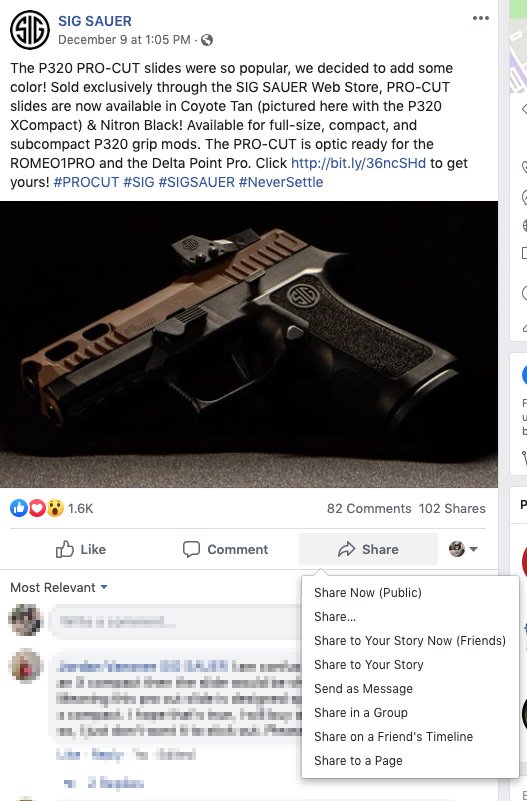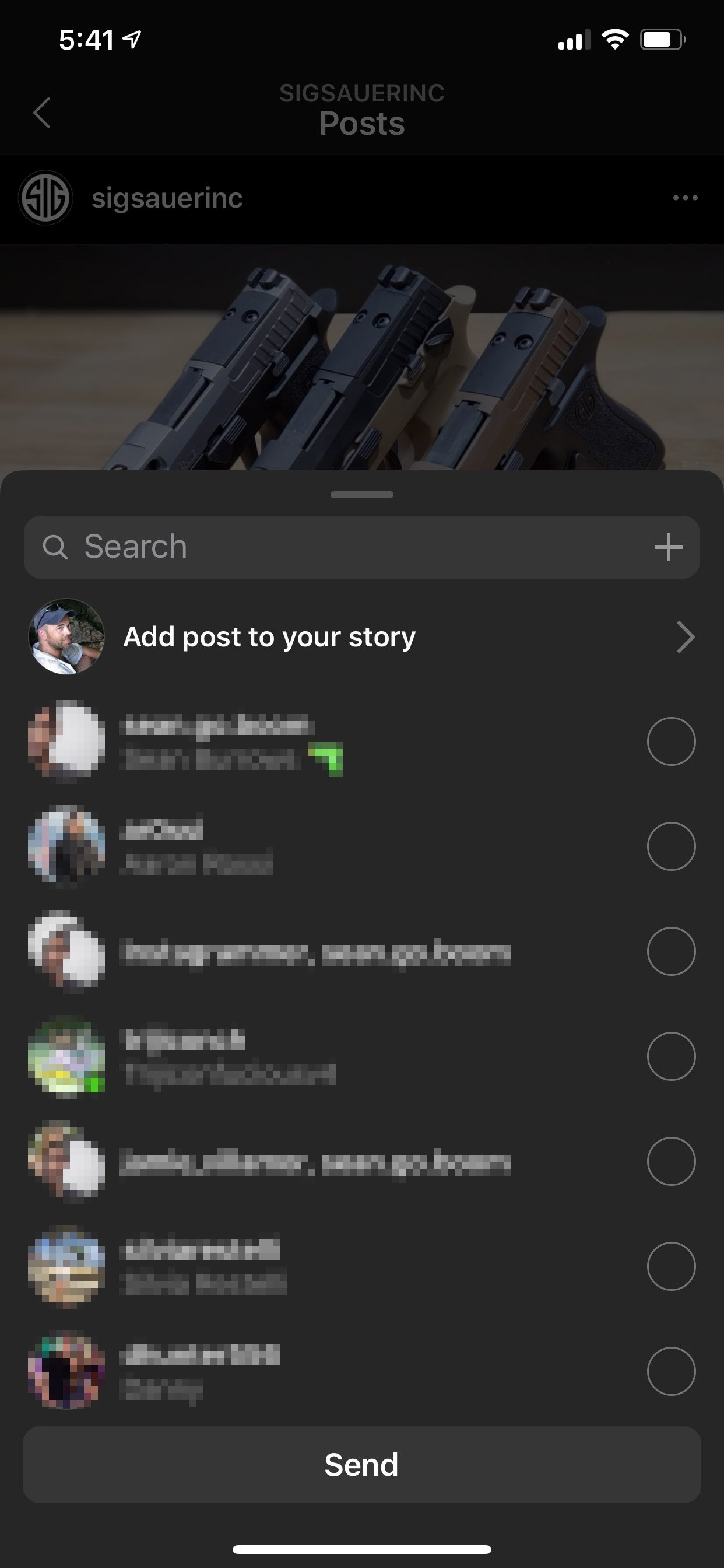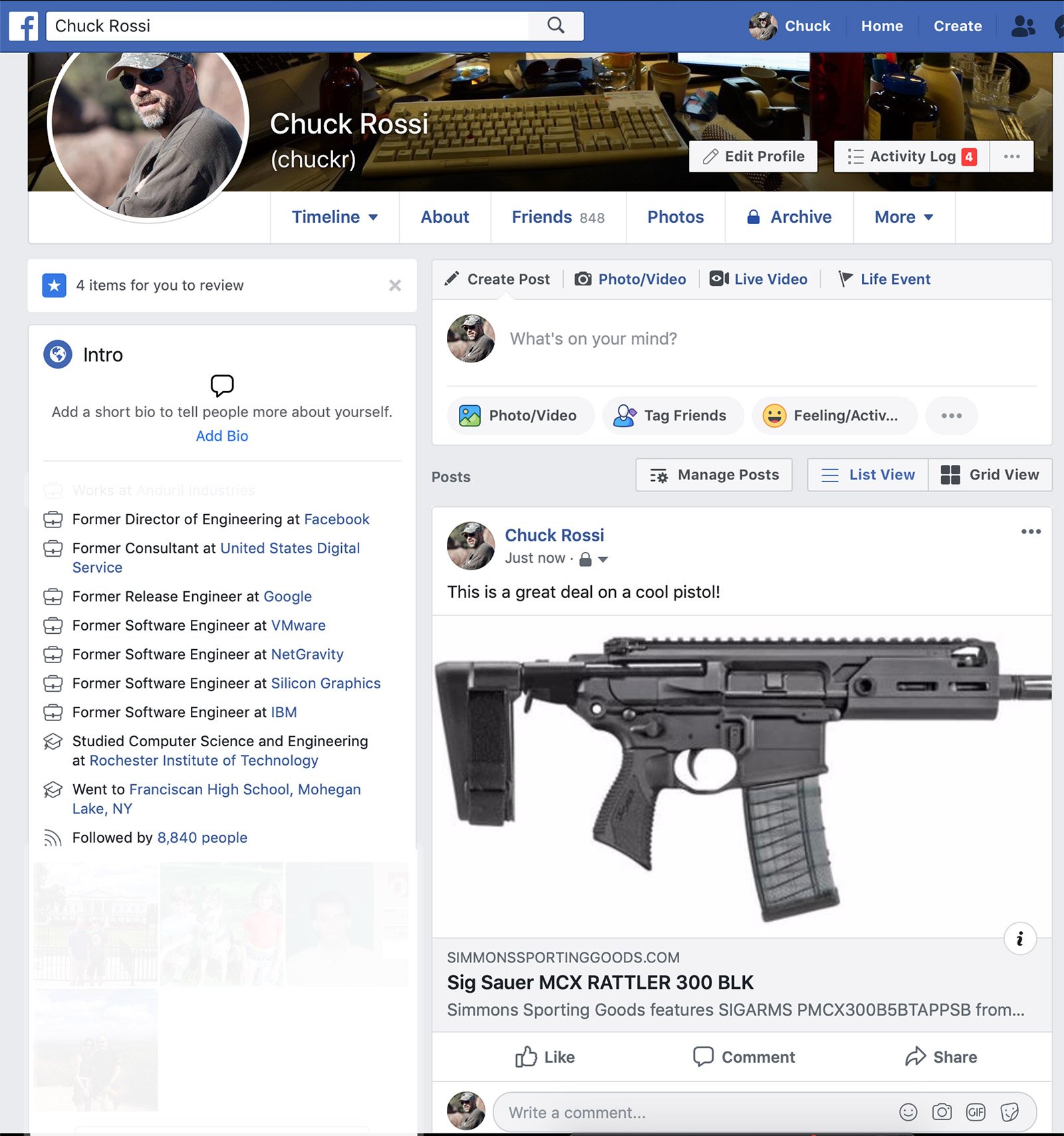Staying social: building our voice in the public square
If you’re a firearms enthusiast or a business that deals with anything in the shooting, hunting, and outdoors space, you know what a challenge it is to navigate the world of social media. Twitter, Facebook, Instagram, YouTube, and the smaller circles of Snapchat, TikTok, Patreon, and Pinterest all have versions of their “Community Standards” that dictate what can and can’t be shared or sold on their platforms with regard to firearms and related gear.
This week, Instagram and Facebook made the waters murkier by announcing new restrictions on creators in a blog post ironically titled “Helping Creators Turn Their Passion Into a Living”. The new policy is at the bottom of the post and states:
“Branded content that promotes goods such as vaping, tobacco products and weapons will not be allowed. Our advertising policies have long prohibited the advertisement of these products, and we will begin enforcement on this in the coming weeks.”
This is a significant change in that it’s a restriction on organic content versus a paid ad or boost. The key will be to understand if this new restriction applies only to people who have an Instagram business account or use the Instagram Brand Collaborations tool. This would seem to be the only way to fairly enforce a restriction like this. If the enforcement goes beyond those areas, we’re looking at a situation where you, as a user of the platform, cannot create content that states “I think this pistol is a great beginner gun and I think it’s what you should get if you’re interested in getting into the shooting sports”. Implementing a policy like this would be exceedingly difficult and would introduce more errors and user frustration in an area that is already having issues with fairness and bias.
I spent almost 11 years at Facebook as an engineering manager but spent the last two years as the resident “gun expert" working to create more fair and transparent policies for content and ads for firearms and related products. I also worked to restore thousands of Pages, Groups, Profiles, and Ads that were incorrectly removed from the platforms as “false positives”. My shooting background is mainly as a competitor (USPSA and 3-gun) and as a certified instructor, range officer, and range master. I’ve taught thousands of people how to safely shoot their first shots and helped many down the road to responsible gun ownership. I’ve worked directly with hundreds of companies, celebrities, and influencers in the firearms and sporting goods industries to help them navigate the complexities of social media. I’d like to share what I’ve learned over the years.
Buy, Sell, Trade of Regulated Goods
It would first help to understand exactly what counts as a problem item in the Facebook ecosystem. Remember what we’re talking about here is the buying, selling, or trading of these items. Not the simple discussion of them. Facebook’s policy on buying, selling, or trading “regulated goods” is found in their Community Standards page. It’s the most specific thing you’re going to find on what’s allowed and you’ll see that they specifically mention “firearms, firearm parts, ammunition, or explosives”. To those of us in the gun world, those words have very specific legal meaning, generally defined by the Gun Control Act of ’68. Facebook’s interpretation is much broader and includes:
Rifles
Shotguns
Machine guns
Handguns
Pistols
Revolvers
Firearm receivers
Firearm parts
Antique guns
Black powder firearms
Muzzle-loading firearms
BB guns
Airsoft guns
Air guns
Air rifles
Paintball markers
Firearm replicas
Non-functioning firearms
Curios and relics
Destructive devices such as bombs, grenades, rockets, missiles or mines
Ammunition and ammo components
Non-culinary knives
So as individuals we can't post those items for buy, sell, or trade.
Business Use
As it stands now, there is actually a fair amount of leeway on Facebook and Instagram to create and share firearm content as a user or a business. I’ll focus on the business side first. The typical businesses I ran into break down into:
- Gun store
- Shooting range
- Sporting goods retail
- Firearms training/classes
- Manufacturer/OEM
All these types of businesses can have a presence as a Facebook or Instagram business page. These businesses can offer regulated goods for sale as long as as they are “representing a real brick-and-mortar store, legitimate website, brand or government agency”. Again, pretty broad, but my experience is that if you create a Facebook or Instagram business page that reasonably looks like a business, you're good to go. If these businesses offer any “regulated goods” for sale, they cannot run Facebook or Instagram Ads. They can only produce and share organic content with no opportunity to boost posts or run ads.
The list of what counts as a prohibited content for ads is much more helpful and clear. If your company or store only has the items in green, you're eligible for ads and boosts. But beware — if there's even one item from the red list on your business page or landing page, your ads will most likely be rejected. It's very frustrating, but even one camping knife on your landing page or business page will poison your ads account and put it at risk for deactivation.
If you're a business and what I'm describing here hasn't been your experience or you've had a business page removed or ads denied, let me know at chuckr@opensourcedefense.org and I might be able to help.
Personal Use and Sharing
While we as individuals can't post any regulated goods for buy, sell, or trade, we can share links and content that does offer those items for sale. For any given Facebook or Instagram Business post, you can fully use the “Share” buttons on Facebook and Instagram.
Facebook Example

Instagram Example

You can also share external links to your personal Facebook or Instagram profile, Facebook page, or Facebook group:

The Problems
On paper, we can see there are some options for the millions of people and businesses who want to use social platforms to legally buy, sell, trade, and discuss their passions and freedoms in the firearms space. In practice, the social platforms have not done a good job in creating or even correctly applying their policies. After talking to hundreds of companies and influencers in this space about the issues they've had with Twitter, YouTube, Instagram, etc. I found some common themes:
- The social companies have been inconsistent, unclear, and unhelpful when it comes to their content and ads policies. There was no interest in helping people navigate the waters and there was no effort to help companies find a path to compliance. They seem to be optimizing for removing firearm content as something unimportant and unwelcome on their platforms.
- There are sudden and arbitrary policy changes. As the Instagram influencer change demonstrates, policy changes can happen suddenly and completely change the status of accounts with no grace period and no chance of a path to compliance. What was fine to do for years is suddenly grounds for deleting your account and all your data with no recourse available to the user. Old content which was policy-compliant at the time of posting is now used as grounds to remove your account and data.
- Less-than-logical policies. It's very clear from both my direct experience and from observing policy decisions on other social platforms that there are no subject matter experts making the policy decisions when it comes to creating or updating firearms policy. The same can be said for those creating and running the training for both the human reps who are making the takedown decisions and the artificial intelligence systems that are trying to automate the process. This should be easily fixable with the right SMEs in place.
- Heavy punitive action. We've all heard the horror stories of people, businesses, and channels suddenly losing their account with no warning and no chance of appeal. While I was at Facebook I personally intervened and restored hundreds of accounts that were incorrectly terminated. Many were 100% internal mistakes, but even if an otherwise compliant company or individual makes a single non-compliant post or ad or has old content flagged, they risk losing everything they've built on the platform.
- Weak-to-no support. If something does happen and you are completely within your rights, there is no practical way to get help in resolving the situation. While most of the platforms have an appeal flow, I've seen countless examples where the appeal gets the same canned, incorrect response. At that point you have very little recourse and have no way to escalate the problem.
Going Forward
A common reaction to these challenges is to go off and find a safe little corner of the internet where these restrictions and biases don't exist. Let's resist that temptation. One of our core principles here at Open Source Defense is to “Come out of the safe”. It's the first bullet point on our homepage. As gun owners, we need to live in the public square and not be pushed off into the corners. This means in order to stay on the platforms, we need to do some extra work.
First off, we should know the details and nuances of the policies. Hopefully this article helps on the Facebook and Instagram side, but sites like YouTube are notoriously vague when it comes to understanding the details of what's allowed. Use their support infrastructure.
Second, we should always be appealing, always be escalating. Use the appeal flows offered by the platforms, use online searches to find the appeal flows that are hidden or might not be obvious, reach out to your followers, and reach out to anyone you know who works at these companies. Failing that, talk to your representatives in government, framing the issue as a consumer protection crisis, not a Second Amendment issue.
Ultimately this is what the issue comes down to. You used these social services as advertised and encouraged. You built or enabled your business there, you put the details of your life and all your precious moments there, you solved all your communication needs there, and now it's all been deleted with no way for you to recover. If your cable company, phone company, utility company, or virtually any other consumer service did this at the scale the social platforms do, it would be a national crisis.
Finally, let's not give up. Stay in the fight. If you lost your business page or personal profile and you were sure you were in the right and following policy, start again while you continue to advocate to get your property back.
Contact
My experience at Facebook made me understand that solving these problems at scale is absolutely doable with the right people and systems in place. I don't think the current solution of throwing literally tens of thousands more contractors at the problem is going to fix it.
I'd like to continue to help in this space, so if you're a social platform and would like some insight on what works and what doesn't, or would like a firearms SME to help you with specific policies or implementation details, please reach out to me.
Likewise, let me know if there are consumer issues I didn't cover here or high profile accounts that have been shut down now or in the future.

